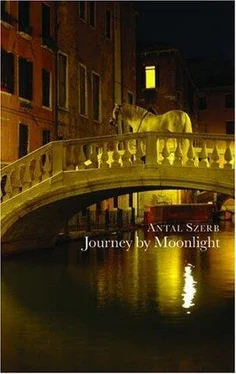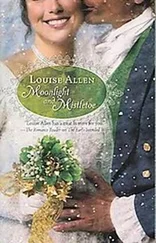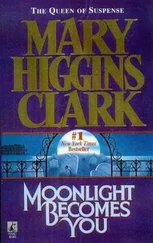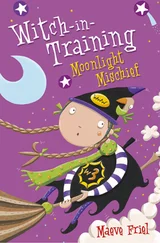Thoughts of Waldheim’s vitality had an unexpectedly invigorating effect on Mihály. Ambushed by a sudden urge to see him again, even if briefly, he suddenly realised how utterly lonely his life had been in recent weeks. Loneliness was an inescapable part of awaiting one’s fate, which was his sole occupation in Rome and impossible to share with anyone. It was now brought home to him for the first time how deep he had sunk into this passive, dreamy waiting, this immersion in the sense of mortality. It was like a tangle of seaweed sucking him down towards the wonders of the deep: then suddenly his head had burst out of the water, and he breathed again.
He must meet Waldheim. One possible way of effecting this now seemed to offer itself. In the article reporting the lecture, mention was made of a reception to be given in the Palazzo Falconieri, the headquarters of the Collegium Hungaricum. He remembered that there was a branch of that organisation in Rome, a hostel for young aspiring artists and scholars. Here they would at least be able to give him Waldheim’s address, if he were not actually living there.
The address of the Palazzo Falconieri was not hard to find. It stood in the Via Giulia, not far from the Teatro Marcello, in the district where Mihály most loved to loiter. Now he cut through the alleyways of the ghetto and soon arrived at the fine old Palazzo.
The porter received Mihály’s inquiry sympathetically, and told him that the professor was indeed in the College, but it was his sleeping time. Mihály looked in amazement at his watch. It was ten thirty.
“Yes,” said the porter. “The professor always sleeps until twelve, and must not be roused. Not that it’s easy to wake him. He sleeps very deeply.”
“Then perhaps I can call back after lunch?”
“Sorry, after lunch the professor goes back to sleep, and cannot be disturbed then either.”
“And when is he awake?”
“The whole night,” said the porter, with a hint of awe in his voice.
“Then it would be better if I left my card and address, and the professor can let me know if he would like to see me.”
When he arrived home late that afternoon a telegram was waiting for him. Waldheim had invited him to dinner. Mihály immediately boarded a tram and set off for the Palazzo Falconieri. He loved the ‘C’ line, that wonderful route which would take him there from the main railway station skirting half the city, passing through various areas of woodland, stopping at the Coliseum, brushing past the Palatine ruins and racing alongside the Tiber, the cavalcade of the millennia passing in procession on either side of the rails, and the whole journey taking just a quarter-of-an-hour.
“Come,” shouted Waldheim in answer to Mihály’s knocking. But when he tried the door it appeared to be stuck.
“Hang on, I’m coming … ” came the shout from within. After some time the door opened.
“It’s a bit choked up,” said Waldheim, gesturing towards the books and papers piled on the floor. “Don’t worry, just come in.”
Negotiating entry was not a simple matter, for the entire floor was strewn with objects of every description: not just books and papers, but Waldheim’s underwear, some extremely loud summer gear, a surprising quantity of shoes, swimming and other sportswear, newspapers, tins of food, chocolate boxes, letters, art reproductions, and pictures of women.
Mihály looked around him in embarrassment.
“You see, I don’t like having the cleaners in while I’m here,” his host explained. “They leave everything in such a mess I can never find anything. Please, take a seat. Hang on, just a second … ”
He swept a few books from the top of a tall pile, now revealed as a chair, and Mihály sat down nervously. Chaos always disconcerted him, and in addition this particular chaos somehow exuded an aura that demanded respect for the sanctity of learning.
Waldheim also sat down, and immediately began to hold forth. He was explaining the state of disorder. His untidiness was essentially abstract, a manifestation of the spirit, but heredity also played a part in it.
“My father (I must have told you about him) was a painter. Perhaps you’ve heard of him? He would never allow anyone to lay a finger on the things piled up in his studio. After a while he was the only one who could go in. He was the only person who knew where there were these islands you could safely step on without falling into something. But then even the islands became buried under the flood of litter. So my father would close up that studio, take another, and begin a new life. When he died we discovered that he had five, every one filled to overflowing.
Then he described what had happened to himself since he had last seen Mihály, his academic career and his world fame as a philologist, about which he boasted with the naïve charm of a little boy. He “just happened to have with him” newspaper clippings, in a variety of languages, which deferentially reported his various lectures, among them the one Mihály had seen in the Popolo d’Italia . Then he turned up some letters from a string of eminent foreign scholars and writers, all very friendly, and an invitation card to Doorn, to the annual summer convention of the Former Emperor’s Society of Post-Imperial German Archaeologists. From somewhere or other he produced a silver goblet inscribed with the ex-Emperor’s monogram.
“See this. He presented it to me after the whole society had drunk to my honour in good Hungarian Tokay.”
Next he proudly displayed his photographs, flicking through a great pile at high speed. In some he appeared with highly academic-looking gentlemen, in others with various ladies of less scholarly aspect.
“My distinguished self in pyjamas,” he expounded. “My distinguished self in the buff … the lady is covering her face in embarrassment … ”
Then, as a final inclusion, Waldheim was pictured with an extremely plain woman and a small boy.
“Who are these? This hideous woman with her brat?” Mihály asked, tactfully.
“Oh dear, that’s my family,” he replied, and roared with laughter. “My wife and my son.”
“You have a family?” Mihály asked in amazement. “Where do you keep them?”
For Waldheim’s room, his manners, his whole being were so much that of the perpetual and incurable university student, with the stamp of the ‘I never want to grow up’ stud. phil . so clearly upon him, that Mihály simply couldn’t imagine him with a wife and child.
“Oh, I’ve been married for centuries,” he said. “It’s a very old photo. Since then my son has got a lot bigger, and my wife even uglier. She fell for me at Heidelberg, when I was in my third year. Her name was Katzchen, (isn’t that wonderful?) and she was forty-six. But we don’t trouble each other very much. She lives in Germany, with my dear father-in-law and his family, and they look down their noses at me. More recently this is not just because of my morals, but because I’m not German.”
“But surely you are German, at least by descent?”
“Yes, yes, but an Auslanddeutsche , from Bratislava, my God, such an outpost in the Danube basin! That doesn’t count as real German. At least that’s what my son says, and he’s intensely ashamed of me in front of his friends. But what can I do? Nothing. But please, eat up. Oh dear, haven’t I had you to dine here before? Just hang on a second … the tea’s already brewed. But you don’t have to drink tea. There’s also red wine.”
From somewhere among the arcana of the floor he produced a large package, removed several objects and papers from the desk and placed them under it, put the package down and opened it. A mass of raw Italian ham, salami and bread spilt out into view.
Читать дальше












